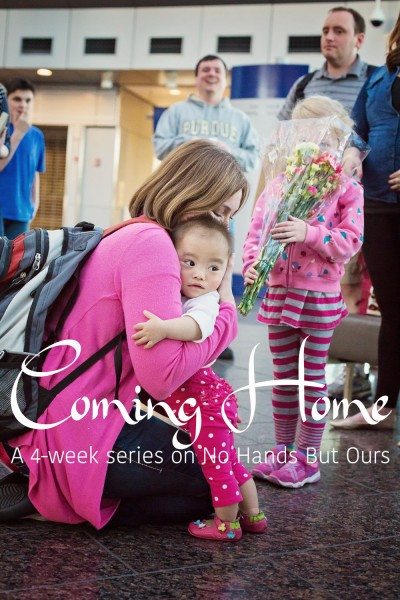Our family has been to China five times and brought home six of our children. And each trip, and child, was so different from the other.
Even when we traveled for two, they were opposites. Our son was like a little businessman and happy as could be with his new family. Our daughter was terrified and wanted nothing to do with me, but also wouldn’t let me put her down, not even to shower or use the bathroom.
With each trip back, I’ve discovered we don’t really get to ‘know’ our child there, but if we’re wise, we can pick up on some behaviors they favor, or triggers that cause a reaction.
All this is key in surviving the fairyland adoption world because let’s face it, China is not real or normal. We are all just surviving until we get home where the new normal can begin.
When I think in terms of discipline, I think of punishment and consequences. A child needing to learn a lesson so they won’t exhibit a certain action again.
Sometimes our children don’t know any better. They have been acting like this for months and years in orphanages and foster homes. How can we expect a child with such trauma and other abandonments to know right from wrong? No matter how old they are at the time, it’s just too much for them to take in.
So maybe there needs to be a paradigm change from thinking in terms of discipline, to interpreting behaviors and triggers.
In my own children we have experienced everything from food hoarding, biting, hitting, spitting, hurting themselves, head banging, to cursing in Chinese.
Were any of those things needing discipline? Did the child know these things were wrong? I think all were behaviors that helped them survive in their previous homes, and then suddenly they weren’t necessary, but they didn’t know that. That’s where observing the behavior and looking for triggers comes in to play, and then being proactive with those observations in the future.
In thinking back on our first days in China with our children, there were things I did to help them cope with the trauma of new people, new living space, new food, no communication, new everything. The biggest being taking them as far back to infancy as possible.
Adopting an eleven month old made that super easy, but when it came to an almost 5 year old, not so easy. I did pull them into my lap to eat, fed them as much as they would let me, played baby hand games to build eye contact, and carried them as much as possible.
Meeting the 3 basic needs in China was pivotal!
Food: We ate as much as possible whenever they wanted to eat. Food to mouth was a huge bonding activity and met one of their most basic needs. In the past, my children had never had enough to eat, so for me to make that available to them was huge.
Safety: Holding them in my lap, covering their face when someone wanted to talk to them, carrying them wherever we went, or STAYING in the room instead of going on a tour were ways we made sure our children felt safe.
Routine: Trying to do the same things each day made for better behavior too. Allowing the children to sleep with us, eating as soon as their eyes were open, playing in a bathtub of bubbles, blowing bubbles everywhere we went, changing into clothes we brought, but maybe letting them wear their old shoes, and keeping them in a carrier or in our arms the whole time when out of our room, were just a few of the things that helped our children.
Now fast forward two weeks and the hardest part to date (flight home) is done, we are home and a new normal is to take place again.
My best strategy at this point was trying to get inside my child’s head and imagine how in the world they feel going from an orphanage or foster home to a mansion (and you know compared to where they lived before, they now are set!). I knew what was going to happen…. They were over stimulated to no end and could not cope with all they were facing.
What to do now at home?
Try to keep all the things you were doing in China the same here at home for the time being.
Food: Feed on demand, and if they were getting a lot of candy in China (we all do it), it needs to continue until you wean them off. Try to make some of the same things they were eating. We all get addicted to toast with butter. Don’t ask me why. SO we eat toast with butter and a fried egg every day for pretty much a month.
Safety: Hold them as much as possible and even carry them if possible.Limit how much of the house they experience and slowly introduce more. Let them sleep with you or right beside your bed. Stay home.
Routine: Cocoon longer than you think necessary. In our experience, we stay home for about three months, and when two came home it was six months. The only things we went out for was Mexican on Fridays and doctor appointments.
Sacred Space: Meet visitors at the door and keep your house sacred for just the people that live there. It is the only way to help the child learn how home is different from their orphanage.
Limit Over Stimulation: Limit the toys your child plays with. More than likely, there were no toys in China, so that poses two problems. One they don’t know how to play, and two they are overwhelmed with too much. One or two new things is enough, and sitting down to teach them how to play is key.
Getting back to discipline vs behavior… being proactive with our children can make the difference between us choosing to discipline or understanding a behavior.
“Those who are hardest to love need it the most.” – Socrates
Isn’t that so true? When our children act out, our first instinct is to discipline the child in hopes of it never happening again. When a child is disciplined, they don’t learn as much as when their parent takes them in their arms, maybe helping the negative behavior to be loved away.
Okay, before anyone thinks I’m all Karin Purvis and our days are perfect adoption utopia, they are not! We have loud mouths and hitting hands and bad attitudes, but if I stop and think about what is triggering them, I can help combat the problem and hopefully turn it around. If not, we (yes me too!) all have a big ole cry and start over.
I do think there are behaviors we aren’t capable of handling on our own and outside help can be the best avenue. Never be scared or ashamed to ask for help. It is a far worse thing to hide and handle alone. I have found my adoption friends to be the most understanding and loving of people, especially when issues with our children are at stake.
Surround yourself with a good support group and be there for others as well. Often sharing your struggles gives someone else the courage they need to reach out too.
All this is hard work and not for the faint of heart. If I’m truthful with myself, lots can be learned from my behavior towards them, so I need all the help I can get!
I drop to my knees every day asking for Help and giving it away to the One Who loves them more than I do.





























Leave a Reply